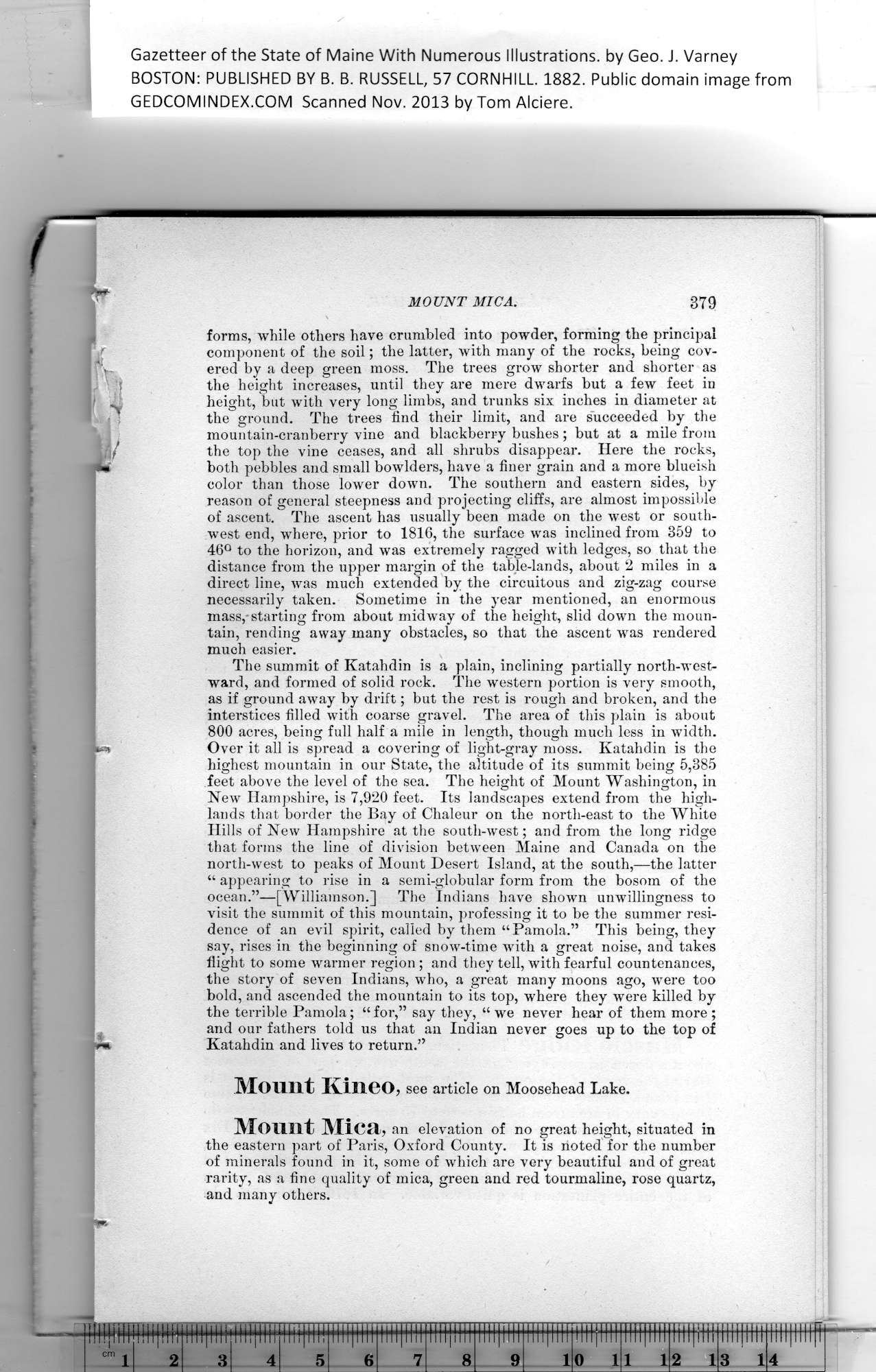|
Gazetteer of the State of Maine With Numerous Illustrations, by Geo. J. Varney
BOSTON: PUBLISHED BY B. B. RUSSELL, 57 CORNHILL. 1882. Public domain image from
MOUNT MICA.
forms, while others have crumbled into powder, forming tbe principal
component of the soil; tbe latter, with many of the rocks, being cov-
ered by a deep green moss. The trees grow shorter and shorter as
the height increases, until they are mere dwarfs but a few feet in
height, but with very long limbs, and trunks six inches in diameter at
the ground. The trees find their limit, and are succeeded by the
mountain-cranberry vine and blackberry bushes; but at a mile from
the top the vine ceases, and all shrubs disappear. Here the rocks,
both pebbles and small bowlders, have a finer grain and a more blueish
color than those lower down. The southern and eastern sides, by
reason of general steepness and projecting cliffs, are almost impossible
of ascent. The ascent has usually been made on the west or south-
west end, where, prior to 1816, the surface was inclined from 359 to
46° to the horizon, and was extremely ragged with ledges, so that the
distance from the upper margin of the table-lands, about 2 miles in a
direct line, was much extended by the circuitous and zig-zag course
necessarily taken. Sometime in the year mentioned, an enormous
mass, starting from about midway of the height, slid down tbe moun-
tain, rending away many obstacles, so that the ascent was rendered
much easier.
The summit of Katahdin is a plain, inclining partially north-west-
ward, and formed of solid rock. The western portion is very smooth,
as if ground away by drift; but the rest is rough and broken, and the
interstices filled with coarse gravel. The area of this plain is about
800 acres, being full half a mile in length, though much less in width.
Over it all is spread a covering of light-gray moss. Katahdin is the
highest mountain in our State, the altitude of its summit being 5,385
feet above the level of the sea. The height of Mount Washington, in
New Hampshire, is 7,920 feet. Its landscapes extend from the high-
lands that border the Bay of Chaleur on the north-east to the White
Hills of New Hampshire at the south-west; and from the long ridge
that forms the line of division between Maine and Canada on the
north-west to peaks of Mount Desert Island, at the south,—the latter
“ appearing to rise in a semi-globular form from the bosom of the
ocean.”—[Williamson.] The Indians have shown unwillingness to
visit the summit of this mountain, professing it to be the summer resi-
dence of an evil spirit, called by them “Pamola.” This being, they
say, rises in the beginning of snow-time with a great noise, and takes
flight to some warmer region; and they tell, with fearful countenances,
the story of seven Indians, who, a great many moons ago, were too
bold, and ascended the mountain to its top, where they were killed by
the terrible Pamola; “ for,” say they, “ we never hear of them more ;
and our fathers told us that an Indian never goes up to tbe top of
Katahdin and lives to return.”
Mount Kineo, see article on Moosehead Lake.
Mount Mica, an elevation of no great height, situated in
the eastern part of Paris, Oxford County. It is noted for the number
of minerals found in it, some of which are very beautiful and of great
rarity, as a fine quality of mica, green and red tourmaline, rose quartz,
and many others.
PREVIOUS PAGE ... NEXT PAGE
This page was written in HTML using a program written in Python 3.2
|
